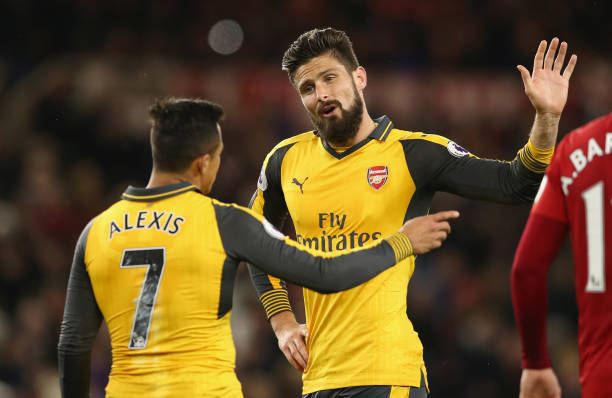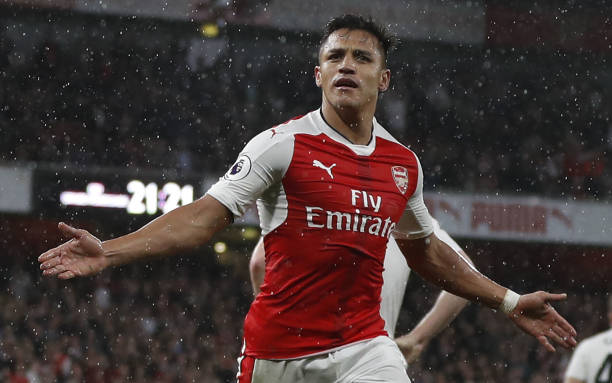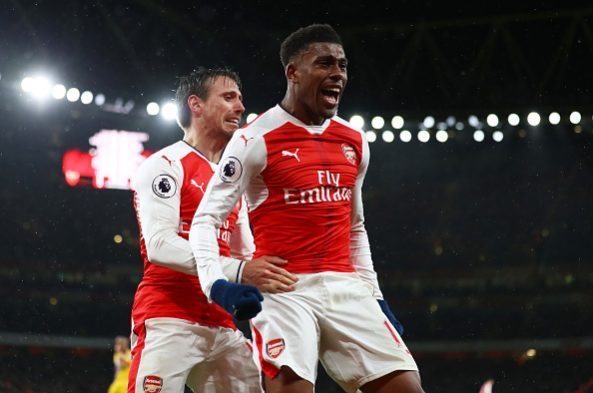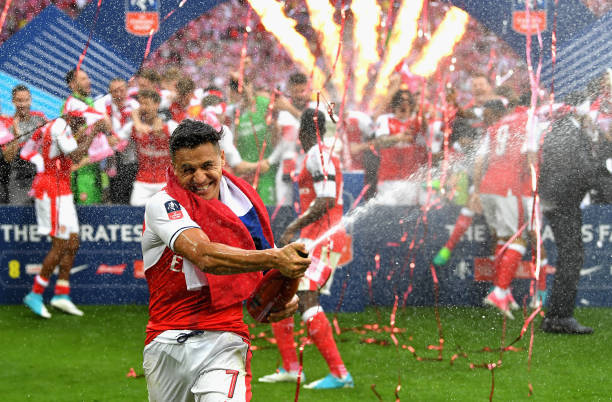It is hardly surprising that the first year Arsenal finished as 5th highest scorers in the Premier League that they find themselves ousted from the top-four.
The Premier League’s remit this season has circulated around counter-attacking football. Whilst it may put a greater onus on wing-backs to contribute to the attacking outcome of the team – it has added a greater deal of emphasis to the clinicality of a team’s forward line. Arsene Wenger has stayed true to his fluid forward line for the majority of the season – with only the alteration of personnel causing any kind of infidelity.
At times, Arsenal’s forward play has been mesmerising. This was particularly evident in Arsenal’s home game to Chelsea. All three forwards interweaved and dovetailed, like a fusion of ballet and jazz. Enough knowledge of each other’s movement to believe it to be choreographed with just enough spontaneity to refute such claims.

Both wide forwards were given special dispensation to meander from their station on the wing to play as a traditional two through the middle with the centre forward remaining anything but central.
If the wide players came narrow, the central player tended to drift wide. Whilst their movement and incisive passing was spellbinding, it was their willingness to press that proved truly absorbing.
However, this mixture of Miles Davis and Swan Lake was unsustainable. For the remainder of the season, Arsenal would struggle to regain those heady heights and occasionally reverted to a more traditional stationary central player with mainstays Özil and Sanchez doing what they do best: namely metronomic passing and constructing chaos.
Whilst this helped to salvage an important point at United, it often frustrated the fans and, occasionally, the players.
Individually, the forward line is not performing as one would wish. Key players have established their importance to the team but those who were vying for a starting place from the bench have struggled for one reason or another.
Firstly, it’s difficult not to overestimate Alexis Sanchez’s importance to the attacking side of proceedings.
Whether played on the left or through the middle, the Chilean has been at the crux of what is exciting about Arsenal’s forward play. He possesses an inventiveness paired with a quickness of mind and feet that so often proves elusive to forwards just outside the top bracket.
For evidence, cast your mind back to his hattrick goal against West Ham. The dexterity required to feint a shot from such close range. To commit an act of subterfuge so beguiling that goalkeeper Darren Randolph was left strewn on his back, followed by a harmonious chip demonstrates his capacity to become a top centre forward.

However, his strength doesn’t lie solely in his goalscoring but in his ability to create. 10 assists in the Premier League with a further three in the Champions League makes him doubly endowed in the Arsenal locker room. 8/10
The second star man is the much maligned Mesut Özil. It is of course possible to enjoy Özil as a player but also bemoan his lack of goalscoring – it neither diminishes you as a fan nor suggests ‘you don’t get him’ as a player.
The reality is that the German playmaker is an incredible footballer with the 360⁰ vision of a tawny owl but his composure in front of goal and his general willingness to shoot can often frustrate.
That said, a return of eight goals and nine assists demonstrate a preparedness to shoot and perhaps a change in his responsibility under Wenger.
His role as chief playmaker has diminished under the induction of Xhaka as a quarter back and his wider starting position in the forward three. However, it doesn’t seem unreasonable to suggest a more clinical striker ahead of him could result in an upsurge in assists for the German. 7/10
Outside of the two heavyweights, Arsene alternated between Welbeck, Giroud, Walcott, Iwobi and, briefly, Lucas Perez.
Theo Walcott started the season reasonably strongly and was part of the demolition of Chelsea at the start of the season.

He showed strength on and off the ball, a rarely seen competitiveness and his usual knack for scoring goals. Yet the winger wasn’t able to continue his fine form and a calf strain in December resulted in a month long spell on the sideline.
He remained a peripheral figure for the remainder of the season with some ill-judged comments as captain following a 3-0 loss to Palace seemingly putting him in the manager’s bad books. Despite contributing 10 goals and two assists, doubts still persist over his ability and suitability in a front 3. 6/10
Danny Welbeck could be described as the antithesis of Walcott. Despite a measly return of two goals – albeit from eight starts and eight appearances from the bench – the England striker offers an interesting mix of direct running, aerial ability and an inclination to press.
His work off the ball makes him a valuable component in a front three, especially if tasked with leading the line. His decision-making is still suspect and his finishing can only be deemed as erratic. But he seems to be the best option when starting the game as a centre forward. 7/10
Which brings me nicely onto Olivier Giroud. The Frenchman has had another solid if unspectacular season. 12 goals from 11 starts in the Premier League fails to really tell the story.
The target man has, rather unfortunately for himself, carved out a niche as an impact sub. His lack of mobility and rather slothful approach to pressing have caused many an Arsenal fan to bemoan his inclusion in the starting line-up.
Regardless, he has proved his value to the squad with important goals – not least rising at the back post against United to power home an important equalising goal. 7/10

Out of all the forwards, it would seem that Alex Iwobi and Lucas Perez are critiqued in far less judicious terms having spent much of the season on the bench or perceived to have been thrust into the limelight too soon.
Alex Iwobi is well liked among the club’s fans. His rangy pass and move style of play with the occasional trick make him a valuable commodity when ball playing forwards are at a minimum at the club.
However, there is an acceptance that it was always going to be tough in his second season and that more can be expected from him in 2017/18. 5/10
Lucas Perez has remained frustrated on the bench for the bulk of the campaign and yet goals on his rare first-team appearances have done little to persuade the manager he is ready to start.
A transfer is mooted and it wouldn’t be unsurprising to see the Spaniard back on home soil by August. 4/10
Whilst it would be naïve to suggest that this forward line couldn’t be improved upon, I believe Wenger will only strengthen if the right player becomes available.
The failure of Perez, the rotation of Giroud and Welbeck and the impending expiration of Sanchez and Özil’s contract may disrupt any potential transfers and dictate a change of tactics next season.
Til next time,
JR

